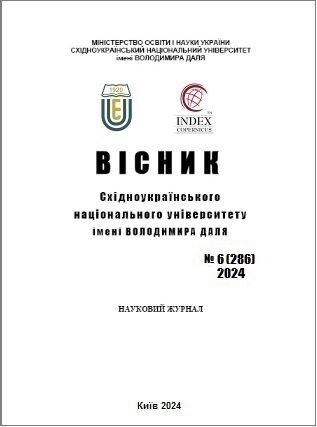Strategic sustainability of organizations: a categorical basis
DOI:
https://doi.org/10.33216/1998-7927-2024-286-6-86-91Keywords:
strategic resilience, strategies, strategic flexibility, strategic development, organization, ecosystem, organizational resilience, innovative activity, digitalization, digital technologiesAbstract
The article proves that the strategic sustainability of organizations is one of the key topics in modern management, which is caused by rapid changes in the economic, social and technological environment. In this context, the ability of an organization to adapt to new conditions, maintain its competitiveness and ensure sustainable development in the long term is important. Strategic sustainability encompasses not only financial stability, but also the ability to innovate, flexibility in responding to external and internal challenges, as well as effective management of resources and risks. One of the important components of the strategy for achieving sustainability is a clear categorical basis, which includes key terms, concepts and tools that allow organizations to navigate in difficult conditions. This basis is the basis for developing strategies, adapting organizational structures, as well as management decisions aimed at ensuring sustainability in the conditions of changing external and internal environments. The aim of the work is to determine the main categories that make up the categorical framework of the organization's strategic sustainability. Defining the main categories and tools of strategic sustainability allows organizations to better understand the dynamics of change, plan long-term strategies, and be prepared for unforeseen circumstances. In the context of globalization and technological transformations, the role of strategic sustainability of organizations becomes particularly important for achieving success and ensuring competitive advantages. Strategic sustainability of organizations is an important aspect of their long-term development and ability to adapt to a changing external and internal environment. The categorical basis, which defines key concepts and tools for ensuring sustainability, is the basis for formulating strategies and making effective management decisions. Strategic sustainability of an organization covers not only financial and material aspects, but also the ability to innovate, flexibility in responding to crisis situations, and risk and resource management. In the context of globalization and rapid technological changes, organizations that take into account the foundations of strategic sustainability have much more chances to achieve competitive advantages and sustainable development. As the global economy and markets become increasingly volatile, implementing strategic resilience principles into organizations is not only an advantage, but also a necessity to ensure their long-term viability and success.
References
1. Krysovatyy, A., & Ptashchenko, O. The mechanism of entrepreneurial innovation system in institutions of higher education. Economics of Development, 2023. 22(2),51-60. https://doi.org/10.57111/econ/2.2023.51. URL: https://ecdev.com.ua/uk/journals/t-22-2-2023/mekhanizm-pidpriyemnitskoyi-innovatsiynoyi-sistemi-u-zakladakh-vishchoyi-osviti
2. Shtal, T., Ptashchenko, O., Rodionov, S., & Kurtsev, O. Implementation of modern marketing tools in entrepreneurial activity. Economics of Development, 2023. 22(4), 53-63. doi: 10.57111/devt/4.2023.53. URL: https://ecdev.com.ua/uk/journals/t-22-4-2023/implementatsiya-suchasnogo-marketingovogo-instrumentariyu-v-pidpriyemnitsku-diyalnist
3. Карпінська М. М. Інтегрована оцінка виробничо-фінансової стійкості підприємства [Електронний ресурс] / М. М. Карпінська, В. М. Костриченко // Студентський вісник Національного університету водного господарства та природокористування. – Випуск 2(4) 2015. С. 141-144. – Режим доступу: http://nuwm.edu.ua/images/content/radamv/Visnyk_4/38.pdf.
4. Кириленко С.В. Формування інноваційної екосистеми підприємництва в умовах цифрової економіки. Вісник Східноукраїнського національного університету імені Володимира Даля, 2024. Вип. 4 (284). С. 36-42. (Index Copernicus). DOI: https://doi.org/10.33216/1998-7927-2024-284-4-36-42 https://journals.snu.edu.ua/?journal=VisnikSNU
5. Крисоватий А., Десятнюк О., Птащенко О. Digital inclusion: financial and marketing aspects. Журнал стратегічних економічних досліджень, № 3(14), 2023. С. 93-102. https://econ-vistnyk.knutd.edu.ua/wp-content/uploads/sites/17/2023/08/3-2023-10.pdf. DOI: 10.30857/2786-5398.2023.3.10
6. Кубліцька, О. В. Тенденції забезпечення стратегічної стійкості ринку електронної комерції в Україні / О. В. Кубліцька // Бізнес-навігатор. 2024. № 3. С. 425-430.
7. Мазоренко, О. Роль соціально відповідального маркетингу в забезпеченні стратегічного розвитку підприємства / О. Мазоренко, С. Олегівна Попкова // Український журнал прикладної економіки та техніки. 2024. Т. 9, № 3. С. 186-189.
8. Пантєлєєва Н.М., Колодій С.Ю., Ребрик М.А. Цифрова економіка як ключовий тренд розвитку постіндустріального суспільства: монографія. К.: ДВНЗ «Університет банківської справи», 2019. 299 с.
9. Піжук О. І., Муравйов В.Є., 2020. Економічні та соціальні наслідки цифровізації національного господарства. Економічний простір. №163, 2020. DOI: https://doi.org/10.32782/2224-6282/163-10.
10. Філіппов В.Ю. Управління розвитком підприємництва за імперативами сталого розвитку в інформаційно-інноваційній економіці: системно-інтегрований підхід. Schweinfurt: Time Realities Scientific Group UG (haftungsbeschränkt), 2020. 489 с.
11. Шамрін Р. В. Розробка методики оцінки економічної стійкості підприємств [Електронний ресурс] / Р. В. Шамрін // Вісник Запорізького національного університету. 2010. Випуск 4(8). С. 103-107. – Режим доступу: http://web.znu.edu.ua/herald/issues/2010/eco_2010_4/2010_4/103-107.pdf.

